25 Points: The Pedestrians
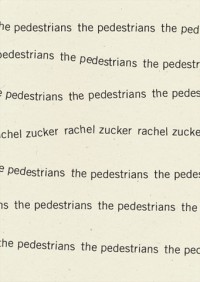 |
The Pedestrians
by Rachel Zucker
Wave Books, 2014
160 pages / $18.00 buy from Wave Books
|
1. The ‘Once upon a time…’-style tone of the beginning of this book reminded me of the short story ‘Clay’ in James Joyce’s Dubliners and what he or someone called the ‘marmaladey-drawersey’ tone it was written in.
2. I really like the phrase ‘sublet bed.’ Sublet properties and the whole poetry of the rented house concept are so often commented on but not sublet beds. Hurray for this.
3. To return to the style and tone for a moment, if we may…(hey that was really formal for a moment wasn’t it, cool) I really like what I’m going to call the circumlocutory descriptions here such as ‘She had a small copper wire inside her. This made conception highly unlikely.’ when she could have said ‘coil’ or ‘intrauterine contraceptive device.’ This starkness really makes me laugh for some reason. In England, there used to be books called ‘Janet and John’ books for small children that used this kind of tone to help the kids learn how to read. They didn’t mention coils or IUCDs but I really think that style transplanted to adult life is cool.
4. ‘Every day she watched the UPS truck come toward her up the/road, make a three-point turn into the driveway before hers,/and pull away’
This is beautiful, man. I can’t say more about it than that.
5. ‘They had not known each other when they were teenagers but/when the radio with the human genome played Phil Collins it/was 1985 bar mitzvah season all over again.’
I have no idea what a radio with a human genome is but the imagery is fantastic that’s just my point I suppose, that’s just my point about this book, the imagery is delicious throughout.
6. Such juxtapositions. Babysitters, Buddhist monks and pole dancing competitions. The world and this book are full of such juxtapositions.
7. Another reviewer worried about this book. They worried about how the main character who lived in the most expensive city in the world (New York) and had trips to Paris and an apparently idyllic bourgeois life with husband and children and so on and yet complained all the time. They worried how this might be taken perhaps. Whilst my own working class proletariat background could go probing into this with my bullshit-detector, instead I was reminded of DFW and his thoughts on his, albeit slightly earlier, generation and how despite all the opulence everyone was still so lonely and miserable and how much of an interesting question this still is (even now the middle-classes have discovered Occupy in their gap year).
8. I’m defending it but it’s ok to worry about that too, I think it’s a valid point. Marxism is one of the better lines of enquiry for me.
9. I have a real affection for the poem called ‘Real Poem’ because it neatly and concisely parodies Poetry (that’s poetry with a capital P) and all its big profundity and arrogance.
10. Reminds me I haven’t had babies yet.
October 17th, 2014 / 12:00 pm
“Gorgeous and Horrific Feelings”: A Review of Lasky’s Thunderbird
 Thunderbird
Thunderbird
by Dorothea Lasky
Wave Books, October 2012
128 pages / $16 Buy from Wave Books or SPD
Dorothea Lasky’s third poetry collection, Thunderbird, begins with the lines “Baby of air / You rose into the mystical / Side of things”—which immediately prompted me to hum Van Morrison’s “Into the Mystic.” It wasn’t a great start to reading this book, but what I realized was that it wasn’t the word “mystical” that brought a song to mind so much as it was the lyricism of Lasky’s writing. As I hummed on, I recognized that the language of “Baby of Air” works through patterns, creating emotion tenor through lines that build on each other. A few lines later, Lasky writes, “People cannot keep air in / I blow air in / I cannot keep it in.” These lines are not typical, flowing lyrics packed with sound play, but are instead a series of seemingly simple phrases that amass meaning through repetition. At times, Lasky’s lyricism even has a blues-like effect in lines like “O you are already there / O you are already there / My brother tells me, you are already there.” Even in this opening piece, poetic lyricism and song come together to form both voice and emotional resonance to carry the reader through the rest of the collection.
However, Lasky’s language does not end at simple repetition. Mixed with this lyric quality (and sometimes at odds with it) are straightforward statements that strike the reader through their baring of the intimate. At times, this approach takes on the negative association of confessionalism—the self-indulgent statement of personal emotion that shuts out the reader—however, at Lasky’s best she filters this private emotion through straightforward statement, creating for the reader a realistic portrayal of human (universal) feeling.
December 21st, 2012 / 12:00 pm
25 Points: Thunderbird
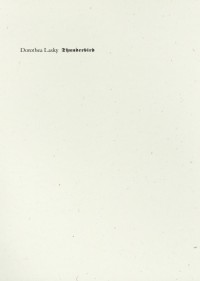 Thunderbird
Thunderbird
by Dorothea Lasky
Wave Books, 2012
107 pages / $16.00 buy from Wave Books
1. Wave Books made a hardcover edition of this book with a pink cover but it is sold out on their website.
2. The only time I’ve seen Dorothea Lasky read was at last year’s AWP (Chicago) where she read in a theater and everyone clapped when she read and thought she was great (I also thought this).
3. After the whole reading was over there was a dance party and Dorothea Lasky was dancing nearby and I told my friend Chris that I liked her poems and I think she heard me and I turned to her and said something like, “Sorry, I’m talking you like you aren’t in the room or something.” She just smiled because she is a nice human being and poet.
4. The title of the book and all the poem titles are typed in what seems like a medieval font–like something one would see on stained glass windows.
5. “I Like Weird Ass Hippies” is probably the funniest poem title in the book (she read it AWP).
6. “I make hell to live in / I make hell”
7. “The world doesn’t care” is a poem that tells the truth and is not complicated; everyone should read it.
8. I am listening to Allo, Darlin’ and writing this and I feel this band is a good soundtrack to Dorothea Lasky’s poems.
9. “Let’s sit in a sea of flames / And I will never put the fire / Out of you” is something I wish a woman will tell me someday when she is talking to me, not reading the poem in which Dorothea Lasky writes it.
10. A person says, “Is this America?” in a poem titled “The Room” and I think lots of poets ask this important question. READ MORE >
November 8th, 2012 / 1:01 pm
Snowflake and Different Streets
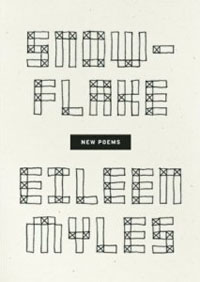 Snowflake / different streets
Snowflake / different streets
by Eileen Myles
Wave Books, Forthcoming April 2012
232 pages / $20 Pre-order from Wave Books
Eileen Myles’ poetry actively, consciously pursues the tangential thought. In her new dual collection of poems, Snowflake and Different Streets, the text glides into the tangent like she has no sense of return, like she’s just floating.
There is confidence behind the lack of linearity and I follow it happily because the text seems to already know that the tangential thought might just be the more exciting thought or as Eileen Myles might say, “the peach of it.”
February 20th, 2012 / 1:00 pm
Into the Snow
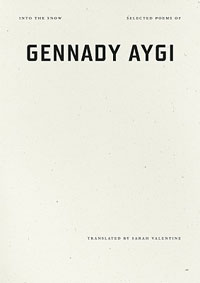 Into the Snow
Into the Snow
By Gennady Aygi
Translated by Sarah Valentine
Wave Books, 2011
128 pages / $16 Buy from Wave Books
“Sidelined in a mass-media, technology-driven culture, the American poet seems to have a slim chance of connecting with an audience, and even less of a chance to effect large-scale change through poetry. But elsewhere in the world many poets…continue to write poetry at the risk of losing their lives and livelihoods. For them poetry is an ethical act, an act of humanity, regardless of the cost.”
– translator Sarah Valentine, in her Introduction to Gennady Aygi’s Into the Snow
Gennady Aygi’s collection of poems all speak of simple people and minimal places. Most involve a specific location, like a clearing or a forest. The simplicity is an illusion that he skillfully employs to challenge the reader to see more. The metaphors are powerful in their simplicity: as Aygi describes a “clearing in the field,” we may first imagine a meadow, but it could be that he’s referring to a transformation in the political climate—moving us from a tangible location to an intangible concept.
November 7th, 2011 / 12:00 pm
much more interesting than this is whether or not UFOs are real: an interview with Matthew Rohrer

I feel like there’s not much I can say about Matthew Rohrer that hasn’t been said already. He is a poet. He is the author of several books. He teaches at NYU. His poems are funny and sad and familiar and strange. There’s a liveliness in their voice and a deep reverence in their construction. They take place outside and inside, in the city and nature, alone and with others, somewhere where the imagination and concrete reality intersect. Despite all of Matt’s experience and worldliness, his poems also have this remarkable ability of never seeming “above the reader,” while at the same time never resorting to familiar tropes. His poems always level with you and remind you what’s good about poetry.
His new book, Destroyer and Preserver, was released this year by Wave. You can read poems from it here, here, and here. We emailed over the past few days to talk about the new book, other people’s books, punctuation, and hurricane Irene gets a shout out too.
Andrew cam: Rohrer/McCann book release
Anthony McCann; new book: “I <3 Your Fate”
Matthew Rohrer; new book: “Destroyer and Preserver”
(It got cut off because I was unknowingly holding the flip cam by its power button — forgive me. It’s still pretty tight though.)
The Book of Frank by CAConrad
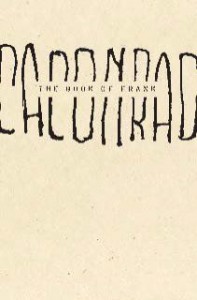 Frank. Yes, he’s that, ribald but also delicate—a reactionary event if only for being born. He’s the subject of CAConrad’s The Book of Frank, first published by Chax Press and freshly picked up by Wave Books, who have padded it with additional poems and a glowing Afterword by Eileen Myles. Despite steady output from Conrad, the book’s creation took over a decade.
Frank. Yes, he’s that, ribald but also delicate—a reactionary event if only for being born. He’s the subject of CAConrad’s The Book of Frank, first published by Chax Press and freshly picked up by Wave Books, who have padded it with additional poems and a glowing Afterword by Eileen Myles. Despite steady output from Conrad, the book’s creation took over a decade.
These are not persona poems, but I’m still curious about the distance between the repressed, ever-morphing Frank, and the poet, so easy in his skin, disarming. I saw CAContrad reading at St. Mark’s Poetry Project this fall: there’s the characteristic nail polish, glittery and red; a wooden Chinese fan sways from his fingers. As he begins, a gladiola leaning against the podium begins to fall. But Conrad catches it. “This is a very unruly gladiola,” he adds, moving on to the next poem with the bloomy staff clasped in hand.
December 3rd, 2010 / 3:30 pm
Live Giants #8: A Crew of Mary Ruefle
In celebration of the release of Mary Ruefle’s Selected Poems from Wave, the eighth installment of the Live Giants online readings series will be next Tuesday, September 28th, at 8PM Eastern. This time we’ll be broadcasting live from two different cities, Chicago and New York, with small crews of local poets in each place reading from Mary’s work, all available for watching here on the site from your computer.
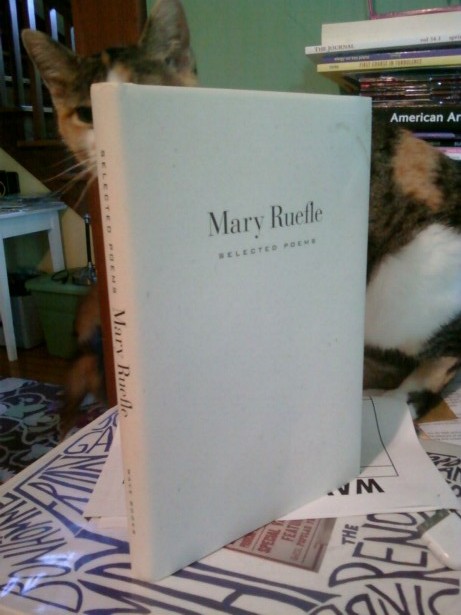
Zucker 5
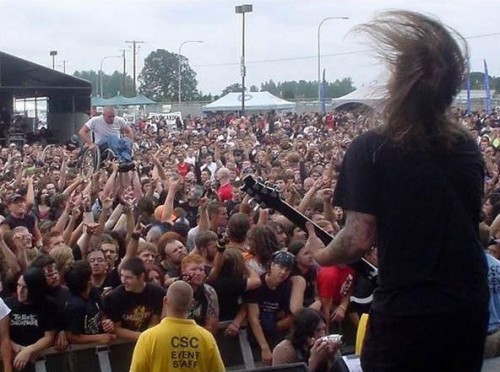
1.) Rachel Zucker has a webpage pretty snazzy. I just read Museum of Accidents (Wave Books). This is the first poetry book of motherhood/professor-hood/adult-at-this-age I have P-rused in a long while. Sometimes the poetry I read keeps caterwhomping subjects same. Museum more mature tone/thunk yet no fields/piles of snow o o o and no wine bottles (or very little) god no chats or BRAND NAMES (or very little).
Bam review here!
2.) What is experimental? In poetry, 2010? Is there still someone hiding their secret sex fetish? Someone afraid to wear a lobster as a hat? No. They just do it and talk out loud. What’s my point? How many more books of line cut/jagged enjamb/white space/concrete forms/codpiece/canon-chop/punctuation verve/retro-madness? Look, mama, no ground! How many books, year, decades before we can drop the term experimental? Stop it.
3.) Well, why don’t you fucking interview the author?
Jesus. OK. I wheel (rolling, rolling…). Answers in bold.
